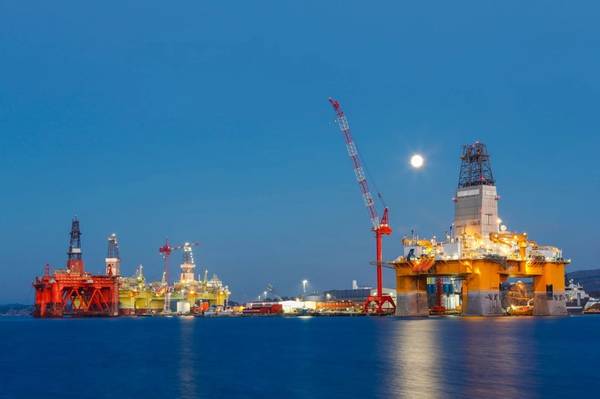
Norway's offshore oil and gas safety watchdog Petroleum Safety Authority has said „is prioritizing the maintenance of its supervisory activities as far as possible given the spread of the coronavirus.“
PSA Norway, whose main job is to monitor how the companies are handling safety and emergency preparedness, said: “Responsibility for conducting activities on the Norwegian continental shelf (NCS) and at the land-based plants prudently and in line with the regulatory requirements rests with the companies.
"The position created by the spread of the virus does not change this – on the contrary, it will underline that allocation of responsibility. Emergency preparations and plans to deal with various incidents or conditions that could affect safety must always be in place.
"In line with its regulatory responsibility, the PSA will continue to monitor how the companies are meeting requirements for safety, the working environment and emergency preparedness in the present circumstances."
Furthermore, the PSA said that its audit program would continue, but be tailored to changing conditions.
"This means in part that these processes will devote particular attention to safety-critical parts of the industry – including company preparedness for dealing with undesirable incidents,“ the PSA said.
Also, the safety body said Thursday it was canceling all its physical meetings with external personnel until further notice and will make maximum use of video meetings, Skype and telephone calls in its contacts with the industry.
Related: Coronavirus Case Confirmed on Equinor's Offshore Project in Norway
"Alternative solutions for conducting audits will be clarified with the individual company,“ the PSA said-
In the event of serious incidents that require investigation or urgent follow-up on offshore facilities or on land, the PSA said it would make special assessments of possible travel to the facility or plant concerned.
PSA's statement comes a day after Equinor, Norway's largest oil company confirmed one of its employees at the Martin Linge development in the North Sea off Norway had contracted coronavirus.
Norwegian Oil and Gas Association advice to members
Norwegian Oil and Gas Association, an industry body representing interests of oil and gas companies in Norway, has established a health expert working group that will provide advice in connection with the ongoing Coronavirus outbreak.
IT has issued a recommendation to operating oil and gas companies regarding how the operating companies should inform personnel who are scheduled to travel offshore to the Norwegian Continental Shelf and who have been in high-risk areas for Coronavirus contagion (Covid-19)
Below is the text of the recommendation:
WE ASK YOU TO IMPLEMENT THE CHANGE WITH IMMEDIATE EFFECT.
It is recommended that the operating companies inform everyone scheduled to travel offshore, a couple of days prior to departure, using the following text via DaWinci or SMS:
If you have been in an area with ongoing transmission of the Coronavirus, do not travel offshore for 14 days since leaving the area. Current areas with ongoing transmission are: China, South Korea, Iran, Italy, Japan, Singapore, and Austria.
If you have been in contact with someone who has been diagnosed with Covid-19 infection, do not travel offshore for the first 14 days after having such contact.
If you have been in any of these areas within the last 21 days or have been in contact with Covid-19 infected person, and experience any of the following symptoms, please contact your medical doctor by telephone and inform of your symptoms and travel history.
Symptoms:
- Cough
- Fever
- Shortness of breath
- Difficulty breathing
If any of these conditions apply to you, contact your nearest manager as soon as possible.
If you have any questions, please contact the operator's health service.
The Norwegian Institute of Public Health on Wednesday afternoon announced a further 212 confirmed cases of coronavirus in Norway in the past 24 hours, making a total of 489.
"The majority are either infected abroad or are close contacts to these cases," the institute said.
Also, Norway's oil and gas industry regulator Norwegian Petroleum Directorate has this week introduced restrictions with regard to the presence in its offices for persons who have been in areas with the prolonged spread of coronavirus.
"If you have been in these areas during the last 14 days, you must not participate in meetings in the Directorate," the Norwegian Petroleum Directorate said Wednesday.
Related: Offshore Oil Rig Infection Exposes Coronavirus Dangers
The World Health Organization on Wednesday made the assessment that COVID-19, a disease caused by the novel coronavirus, can be characterized as a pandemic.
"We have never before seen a pandemic sparked by a coronavirus. This is the first pandemic caused by a coronavirus." Tedros Adhanom Ghebreyesus WHO's Director-General said.
He said: "Pandemic is not a word to use lightly or carelessly. It is a word that, if misused, can cause unreasonable fear, or unjustified acceptance that the fight is over, leading to unnecessary suffering and death...Describing the situation as a pandemic does not change WHO’s assessment of the threat posed by this virus. It doesn’t change what WHO is doing, and it doesn’t change what countries should do."
In a briefing on Thursday, he reiterated the reasons behind characterizing COVID-19 as a pandemic, and said some countries aren't doing enough to fight the situations: "We have made this assessment for two main reasons: first, because of the speed and scale of transmission.
"Almost 125,000 cases have now been reported to WHO, from 118 countries and territories. In the past two weeks, the number of cases reported outside China has increased almost 13-fold, and the number of affected countries has almost tripled."
"The second reason is that despite our frequent warnings, we are deeply concerned that some countries are not approaching this threat with the level of political commitment needed to control it."
"Let me be clear: describing this as a pandemic does not mean that countries should give up. The idea that countries should shift from containment to mitigation is wrong and dangerous. On the contrary, we have to double down."